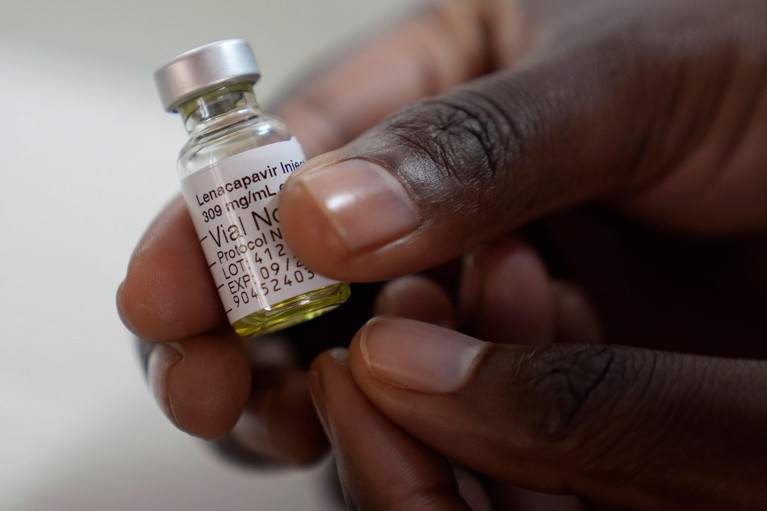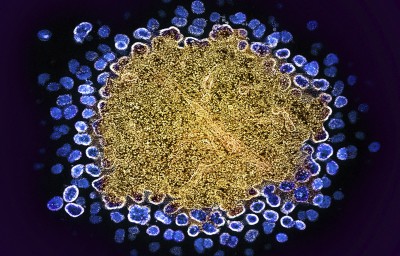At a serious HIV convention in July, scientists introduced {that a} seventh individual had been ‘cured’ of the illness. A 60-year-old man in Germany, after receiving a stem-cell transplant, has been freed from the virus for nearly six years, researchers reported.
Seventh affected person ‘cured’ of HIV: why scientists are excited
The primary such occasion of eliminating HIV from an individual on this method was reported in 2008. However stem-cell transplants, regardless of being extremely efficient at ridding folks of the virus, will not be a scalable technique. The remedy is aggressive and poses dangers, together with long-term issues from graft-versus-host illness — a situation wherein donor cells assault the recipient’s personal tissues. The process was solely doable within the seven efficiently handled folks as a result of all of them had cancers that required a bone-marrow transplant, says Sharon Lewin, an infectious-diseases doctor who heads the Peter Doherty Institute for An infection and Immunity in Melbourne, Australia. “We might by no means even ponder this for somebody who was in any other case wholesome,” Lewin says. “Nobody is considering this as a treatment for HIV.”
The usual remedy for HIV is antiretroviral remedy (ART), which includes a mixture of medication, often taken day by day, that stops the virus from replicating contained in the physique. ART can cut back an contaminated individual’s viral load to an undetectable degree, stopping the virus from wreaking havoc within the physique and drastically decreasing the danger of transmission. However, for many individuals, such a technique will not be sufficient.
Longer-term options are within the works. However how shut are we to a treatment for HIV — or a vaccine? Nature spoke with specialists to search out out.
What advances have been made within the remedy of HIV?
Issues similar to unreliable provide of the medicines, drug resistance and the stigma surrounding HIV an infection imply that tons of people that take ART are hoping for longer-term options. “Many sufferers say they’re prepared to take the danger of opposed occasions and even mortality threat to be cured of HIV,” says Ravindra Gupta, a microbiologist on the College of Cambridge, UK.
In many of the stem-cell-transplant instances, the cells that folks obtained contained a mutation that stops the expression of CCR5, a protein that the HIV virus makes use of to enter cells.
Though this process will not be doable in most individuals with HIV, its success in a small variety of sufferers has led to the event of gene therapies that concentrate on CCR5. There are additionally gene therapies within the pipeline that concentrate on the virus itself; for instance, by inserting a gene that produces antibodies that preserve the virus below management.
Different avenues of investigation embody efforts to regulate or remove the latent HIV reservoir, which is a pool of HIV-infected cells that don’t produce viral particles. These cells are thus hidden from the immune system, however they’ll reawaken after an individual stops ART. Strategies that concentrate on this latent reservoir embody boosting the immune response, waking and attacking dormant HIV-infected cells or placing the virus in reservoirs completely to sleep.
Most of those therapies have but to make it previous part I or II in medical trials, based on Lewin. “We’re nonetheless speaking about early days.”
There have, nevertheless, been advances in longer-term remedies prior to now few years. In 2020 and 2021, regulatory companies in a number of nations authorized a mix of injectable antiviral medication, cabotegravir and rilpivirine, which could be given each two months to individuals who have HIV to maintain the virus at bay. And in 2022, regulators authorized the injectable lenacapavir, which is simply wanted each six months.

The antiviral drug lenacapavirCredit score: Nardus Engelbrecht/AP by way of Alamy
What about stopping transmission?
Within the absence of vaccines, pre-exposure prophylaxis, or PrEP, has been key to stemming the unfold of HIV. Till just lately, PrEP existed solely within the type of oral medicines that have to be taken day by day to be efficient. When used appropriately, oral PrEP reduces the danger of contracting HIV by about 99%.
A few of the injectable antivirals authorized as long-acting HIV remedies have additionally proved to be efficient at stopping an infection. In 2021, the US Meals and Drug Administration (FDA) authorized cabotegravir for prophylactic use. Lenacapavir may also quickly be accessible as a PrEP drug: in a research1 revealed in July, researchers reported that twice-yearly photographs of lenacapavir efficiently prevented HIV an infection in a cohort of greater than 2,000 sexually energetic younger ladies and adolescent women. Compared, among the many group who obtained oral PrEP, about 2% contracted the virus.
Ricardo Diaz, an infectious-diseases doctor on the Federal College of São Paulo in Brazil, who’s a principal investigator in a medical trial of lenacapavir, says that there are some limitations of the injection. For instance, unwanted side effects on the pores and skin can lead some folks to cease taking the drug. And its effectiveness has but to be decided in males (a medical trial of males is ongoing). However, given the efficacy seen within the just lately revealed trial, lenacapavir “could also be a sport changer for HIV epidemics”, Diaz says.
What is going on in vaccine improvement?
The sphere has made regular progress in direction of a vaccine because the first HIV an infection was reported in 1981 — however there’s nonetheless a protracted solution to go, says Rama Rao Amara, an immunologist at Emory College in Atlanta, Georgia.
One of many greatest challenges dealing with the sphere is growing a vaccine that may broadly neutralize the a number of strains of the HIV virus, Amara says. On high of that, the truth that the virus is closely glycosylated — coated in sugar molecules — makes it troublesome to design an antibody that may break by this barrier.
In a pair of papers2,3 revealed in Science Immunology on 30 August, researchers report an immunogen that may generate potent, broadly neutralizing antibodies in opposition to the HIV virus in macaques. These research show that it’s doable to at the least start the method of partaking immune cells to supply broadly neutralizing antibodies, says Amara, who penned a commentary4 accompanying the papers. “That isn’t a simple job.” The immunogen, dubbed GT1.1, is at present being examined in a part I medical trial.
“HIV will not be a simple virus to take care of,” Amara says. “In any other case, we might have already had a vaccine.”



